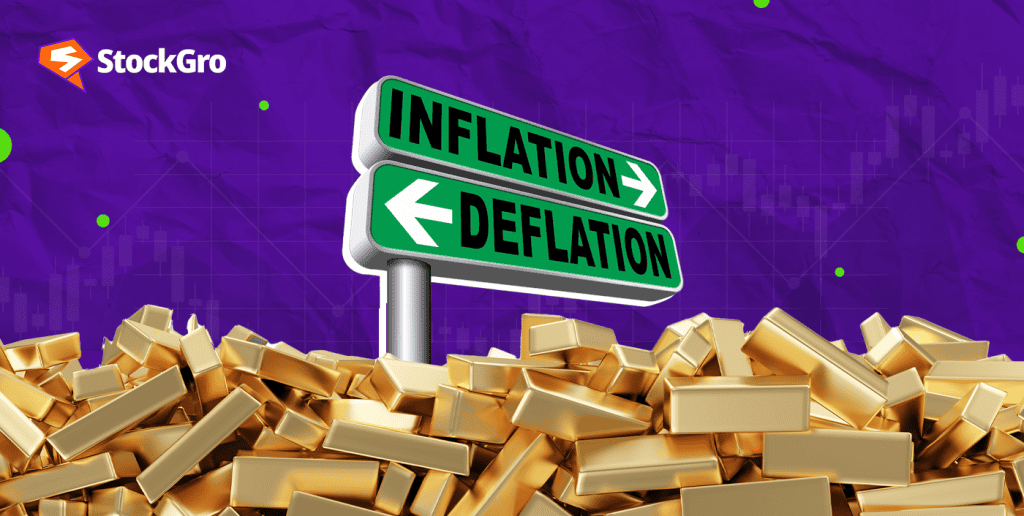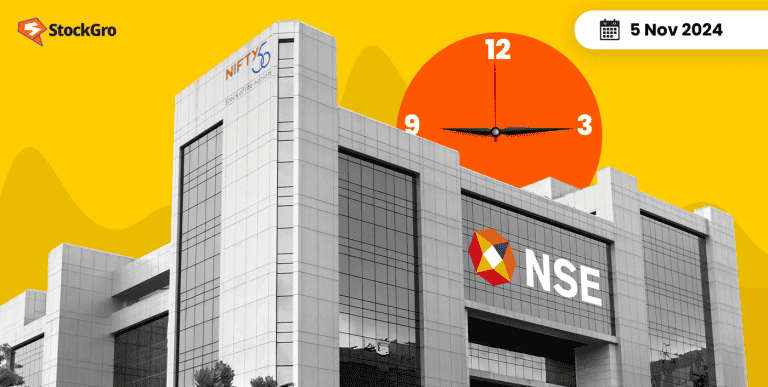
Gold has been the most coveted commodity in India for years. Nothing can beat gold when you go for expensive shopping. Gold is a go-to asset to invest in, not just for ornamental purposes or a status symbol now.
However, the relationship between gold prices during inflation and deflation is complicated. The economy does not remain in the favour of investors all the while. So, there is always a question in investors’ minds about how to tackle unfavourable times. Since gold and inflation & gold and deflation are two different aspects of the economy, let us study them one by one.
Also read: Gold vs Equities- Which is the right investment option?
Gold and inflation
Inflation refers to a state in the economy when prices for availing goods and services go up. And, you lose the power to purchase commodities because of high prices. Recently, in September 2024, the inflation rate in India was recorded as 5.49%.
In the case of gold, investors use gold to preserve their buying power during inflation. However, when you see an increase in the cost of living, you see an increment in gold prices too. For example, from 1974 to 2008, the U.S. faced eight high inflation periods. Each time, the value of this yellow metal soared, averaging a 14.9% annual climb.
Let’s understand gold prices during periods of inflation.
- A secure investment in difficult times
During inflation and normal economic conditions, gold becomes a popular alternative to preserving value when stocks and bonds start losing value. In fact, over the past decade (from October 24-2014 to October 25-2024), the correlation between MCX Gold and the BSE Sensex has been -0.026, highlighting its independence from stock movements.
As inflation accelerates, demand for gold increases. While fiat currency weakens, this precious metal holds steady. Its limited supply intensifies competition among investors, driving up prices further.
Borrowers may see some relief from inflation’s impact on debt, yet consumers face a different reality—diminished purchasing power and rising costs. In uncertain economic times, gold remains a haven asset, maintaining its value when other options falter.
- The impact of gold on the financial market
The Reserve Bank of India’s monetary policy is influenced by several crucial factors which include the gold market and inflation levels. These factors shape policy decisions as they reflect economic stability.
During economic uncertainty, investors view a combination of gold and inflation-prone assets as safer investment options. Consequently, investors often liquidate other types of assets in favour of gold. This shift in investor behaviour can lead to significant fluctuations in the financial markets, impacting liquidity, market stability, and overall investor sentiment.
You may also like: Impact of Inflation on Personal Finances
Gold and deflation
Deflation is when there is a fall in the price levels in a country. Unlike inflation, deflation harms the prices of gold. During deflation, the economy slows and investors are more interested in cash and other low-risk assets.
It is the opposite of inflation. During global deflation, gold demand tends to increase as a hedge against paper currency and the increasing private and public sector default risks. The Government and central bank balance the decline in private sector demand.
What repercussions does deflation have on gold, let us have a look into it.
- Interest in cash
During deflation, investors ignore gold and prefer collecting cash due to its high availability in the future. The combination of gold and deflation seems non-profitable to people because its prices start to fall. A report suggests that world growth averaged a 4% rate in the baseline due to deflation in 2015.
This is due to increased financial stress and a mismanaged policy response leading to lesser money supply and a massive decline in the emerging countries and consequently in the world output.
Moreover, the opportunity cost of gold increases as investors favour assets that yield returns, such as bonds, even at low interest rates. Such demand reduction was observed in the 2020 pandemic, where gold demand for jewellery and industry dropped by 34% due to deflationary concerns and an economic slowdown as per the World Gold Council.
- Decline in gold prices due to reduced consumer demand
During deflation, investors are likely not to invest in gold as its prices start to decline as economic activities slow down. Because they can not make any profit out of it. So, we see a decline in gold prices when its demand lowers.
With lower demand, the value of gold tends to decrease, making it less attractive as a safe-haven asset. This trend often shifts investors’ focus toward cash reserves or other low-risk assets, which are seen as more beneficial during deflationary periods. Businesses limit their spending and the gold’s appeal as a consumer good declines. This lower demand invokes the prices, making it less attractive to investors as compared to more liquid assets such as cash, which offers an immediate value during such a scenario.
You may also like: What is 916 gold? Your ultimate guide to understanding its value
Conclusion
The unstable economic conditions, whether inflation or deflation, can significantly impact investment decisions, especially with gold. While inflation often makes investors invest in gold, deflation makes cash and other low-risk options such as treasury bills more preferred.
One must understand the key indicators like the Consumer Price Index (CPI), Gross Domestic Product (GDP), and central bank policies to navigate through these tough times. By keeping a check on these factors, investors can make informed decisions, balancing their portfolios to mitigate risks regardless of market conditions.
FAQS
- How does economic instability affect gold prices?
An imbalance between the demand and supply is the major cause of economic instability. Hence during inflation, i.e., when the demand is high and supply is low, cash becomes scarce. People then benefit from their investments by investing in gold instead of cash. However, during deflation, with excess cash in circulation, people tend to hold onto cash rather than invest in gold, leading to a drop in gold prices. This cyclical behaviour directly links gold prices to economic conditions.
- How do monetary policies affect the economy and gold prices?
Besides the imbalance in demand and supply, interest rates and reserve requirements set by central banks also significantly impact a country’s economic stability. For example, low interest rates encourage people to buy and spend more, while high interest rates drive inflation higher. These monetary policies can either stabilise or destabilise the economy and, consequently, influence gold prices. Additionally, central banks themselves may buy or sell gold reserves as part of their economic strategy, further impacting gold’s value in the market.
- What is the relationship between the prices of gold and deflation?
In a single line, gold prices tend to fall during deflation, as investors usually avoid gold investments. Instead, they hold onto cash to maximise benefits when economic instability subsides, with bonds, treasury bills, or cash seen as the wisest choices during deflation. This cautious approach helps investors maintain liquidity, preparing them for profitable opportunities once the economy stabilises.
- Which factors affect gold prices?
Gold prices are influenced by several factors, primarily driven by global demand and supply dynamics. Economic conditions, such as inflation and interest rates, play significant roles; higher inflation tends to increase gold’s appeal as a store of value while rising interest rates can make other assets more attractive. Additionally, cultural influences, particularly in countries where gold is symbolic, contribute to consistent demand.
- When can gold prices crash?
It is a rare incident to occur, though, as the US Dollar plays a vital role in determining gold prices. Therefore, global economic events such as interest rate changes, geopolitical tensions, or financial crises can disrupt investors’ calculations. This is where gold prices may crash, as fluctuations in the US Dollar’s value can shift gold’s dynamics worldwide. Additionally, currency volatility directly impacts gold’s appeal, often driving investors to reassess their portfolio allocations in uncertain times.

